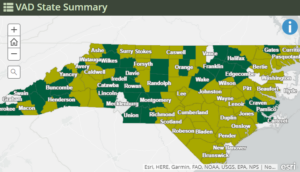Voluntary Agricultural Program (VAD)
go.ncsu.edu/readext?960070
en Español / em Português
El inglés es el idioma de control de esta página. En la medida en que haya algún conflicto entre la traducción al inglés y la traducción, el inglés prevalece.
Al hacer clic en el enlace de traducción se activa un servicio de traducción gratuito para convertir la página al español. Al igual que con cualquier traducción por Internet, la conversión no es sensible al contexto y puede que no traduzca el texto en su significado original. NC State Extension no garantiza la exactitud del texto traducido. Por favor, tenga en cuenta que algunas aplicaciones y/o servicios pueden no funcionar como se espera cuando se traducen.
Português
Inglês é o idioma de controle desta página. Na medida que haja algum conflito entre o texto original em Inglês e a tradução, o Inglês prevalece.
Ao clicar no link de tradução, um serviço gratuito de tradução será ativado para converter a página para o Português. Como em qualquer tradução pela internet, a conversão não é sensivel ao contexto e pode não ocorrer a tradução para o significado orginal. O serviço de Extensão da Carolina do Norte (NC State Extension) não garante a exatidão do texto traduzido. Por favor, observe que algumas funções ou serviços podem não funcionar como esperado após a tradução.
English
English is the controlling language of this page. To the extent there is any conflict between the English text and the translation, English controls.
Clicking on the translation link activates a free translation service to convert the page to Spanish. As with any Internet translation, the conversion is not context-sensitive and may not translate the text to its original meaning. NC State Extension does not guarantee the accuracy of the translated text. Please note that some applications and/or services may not function as expected when translated.
Collapse ▲North Carolina Department of Agriculture & Consumer Sciences (VAD)
Voluntary Agricultural Districts Benefits:
• Encourages the preservation and protection of farmland and working forests.
• Allows landowners to publicly recognize their farms.
• Establishes an Agricultural Advisory Board in the county.
• May protect farms from negative impacts, such as waivers of water and sewer assessments, and public hearings for proposed condemnation.
• Allows for Enhanced Voluntary Agricultural Districts to protect farms from development for 10 years.
Currently, 91 counties in North Carolina have county ordinances for Voluntary Agricultural Districts. Across the state, 10,865 farms and 897,057.26 acres of working farms and forests are enrolled in the program.”




